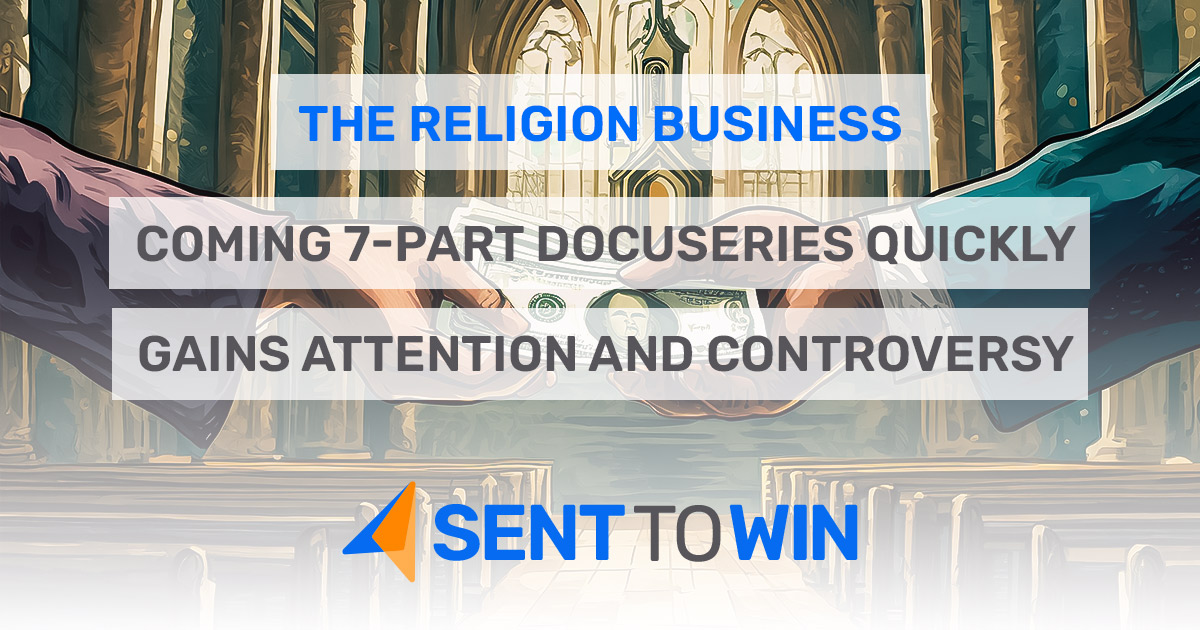The Religion Business – Coming 7-Part Docuseries Quickly Gains Attention and Controversy
In today’s newsletter:
- The Religion Business – Coming 7-Part Docuseries Quickly Gains Attention and Controversy
- Real Estate, Bitcoin, and Church Buildings
- Essentialism: The Disciplined Pursuit of Less
It started 10 years ago.
Troubled by the direction of American/Western Christianity, an award-winning documentary filmmaker named Nathan Apffel teamed up with successful businessman and former military officer Chris Ayoub to do extensive research, interviews, and creative work to produce something that might make a difference. The result is “The Religion Business,” a 7-part docuseries that will be released in just a few months, aimed at exposing the rampant fraud, theft, and mission drift running through our religious institutions.
“I am not on this journey with Nate to be a critic,” Chris says, “I am here to use the skillset God blessed me with to do the work necessary to bring positive change by providing religious institutions and donors the tools necessary to execute their intended purpose.”
The Religion Business’s Instagram account, which launched only in October of last year and has gained 100,000 followers in just five months, focuses on the need for financial accountability, transparency, and what happens when we do not address rampant hypocrisy and abuse inside the church. A lot of the talk is about the money.
“If you repurposed 27 cents of every dollar that the Western Christian church has, it could radically transform the face of the world – and be the light of the world – literally tomorrow,” Nate says in a conversation with the host of the popular social media account PreachersNSneakers. “So then all the people who are hating on Christianity as Christianity is declining are gonna say, ‘You know what? They’re actually doing some cool stuff. I don’t mind going back.’ And that’s what we see on TikTok and on our social media channels – especially TikTok – is there are so many people out there angry at the institution. They aren’t angry at God or their faith; they’re angry at the institution, and they have every right to be.”
According to the numbers, he may have a point:
$890 billion dollars is donated to the Western Christian church every year. “Where does all that money go?” one person asked online.
The answer is not terribly impressive.
“44% goes to salaries, 6% leaves the institutional walls for outside purposes such as missions, and 6% is stolen internally by church staff,” Chris reports, tackling a few key areas of concern.
The theft is, naturally, a problem – the same amount is stolen as is given to mission work! It seems pathetic that we can only manage to give 6% of people’s hard-earned money to spread the good news. What’s worse is the theft numbers do not include obviously immoral, greedy practices, such as a megachurch pastor or televangelist purchasing a private jet that is “owned” by the ministry, or over-the-top salaries and benefits, such as Kenneth Copeland’s $50 million annual earnings. Some of the more PR-savvy, extreme net-worth individuals do not take a technical salary but extract millions from the church in other ways, so they are taking exorbitant amounts of money while trumpeting that they “don’t take a salary.”
“It’s just so amazing that that hustle still works. The prosperity ones are so gross because they go after people that are so poor and destitute that they can’t pay their bills, and they say, ‘If you send me money, God will pay you back tenfold,’” says popular podcaster Joe Rogan. “You have a private jet – it’s so obvious,” he said on another occasion. “You have a mansion – it’s so obvious.” He’s quick to say that a lot of churches do a lot of good, and he isn’t against religion in general, but the large number of grifters make him sick.
This, unfortunately, is often the perception of the church outside the church.
It isn’t just theft and corruption that causes issues with how we handle money. It’s also inefficiency, carelessness, and waste.
For comparison, the American Red Cross keeps administrative and fundraising expenses under 10% of its budget. World Vision is around 11%. When you look at the average church, however, and add together building expenses, personnel expenses (including salaries), and administrative expenses – it comes out to over 80% of the budget.
“I’ve reviewed hundreds of church income statements,” says Christopher Pavkovich, a commenter on The Religion Business’s IG account online. “Most goes to the pastor, organist, assistant pastor, treasurer, secretary. Little goes to actually doing anything good for the community.”
Some viewers online have been greatly encouraged to see this work of exposing very real problems within our churches, which have gone from being “the ecclesia, to a philosophy, to an institution, to a culture, to an enterprise,” and want to see it restored to being the ecclesia, the gathering of the saints for the purpose of being equipped to do the work of ministry in the world.
Other viewers… have had a different reaction.
The Religion Business posted this quote and question on X: “‘The way to preserve the peace of the church is to preserve the purity of it.’ – Matthew Henry. How can we do this?”
In response, one user replied, “The way to preserve the peace of the church is to preach the gospel and not create these hypocritical self-aggrandizing 501c-3 organizations whose ‘mission’ is to supposedly expose large successful ministries they disagree with.”
This is a common theme in the comment section online whenever The Religion Business posts a video, especially when it comes to discussing how tithes and offerings are used. Still, most of the responses seem, on balance, to be generally positive so far.
No doubt, Apffel, and Ayoub will be under increased scrutiny as their findings and recommendations come out through their docuseries in a few months. Apffel has a couple of strange credits on his IMDB account and no doubt Ayoub’s attempts to create an app to help improve financial transparency for churches will be interpreted as a cynical play for financial gain from the problem. (We don’t have a lot of details as of now on that front, nor any indication that a product will be sold off of this production, and we have reason to believe that any app provided may end up being free. Time will tell.) As it stands, it seems that the motive of the film series is simply to expose corruption, to spark positive reform, and to take away the stain of greed, manipulation, and poor stewardship from our churches.
That is something, by the numbers, that we badly need.
INDUSTRY INSIGHTS
Real Estate, Bitcoin, and Church Buildings
Real Estate
Home foreclosures have risen sharply in the last month amid continuing inflation, a rising supply, and the worst tech layoffs since the dot-com collapse of 2001. After settling an antitrust lawsuit, the realtors association has agreed to end the standard 6% commission on buying and selling a house. As a result, commissions are projected to fall 25-50%, lowering home prices by perhaps $6-12k on average, according to TD Cowen Insights. Despite the commission reduction and the increased supply, experts say homes will not likely become affordable in the near future. Amid the strange market conditions, we are seeing conflicting reports, such as this one from Bankrate titled “Rates Down,” reporting a national average 30-year fixed loan at 6.88%, posted mere hours apart from Forbes’ report, titled “Rates Move Up” reporting that 30 year fixed mortgage rates are averaging 7.49%. In other words, it continues to be a strange market for single-family homes.
Bitcoin
Investors are keeping a close eye on Bitcoin (BTC) in the wake of a tremendous rally this month and then a sudden sell-off that has seen the digital asset go from $52k to a high of $73k before quickly correcting down to about $62k. Despite all of this, some say that Bitcoin could soon lose its reputation as a volatile asset, as they see recent price corrections (sizeable though they are) as less dramatic than in times past. We may see much greater movement in the price of BTC soon, however, as more cash floods into the digital currency from the recently sanctioned spot ETFs. Also of note is that the periodic “halving” event is coming up next month, during which the rewards for Bitcoin miners who successfully complete transactions will be cut in half.
Suggestions as to what this will mean for the asset are all over the map. The bulls seem to think Bitcoin could top $150k in only a few months, and the more excitable “hyper bulls” are calling $1M per Bitcoin within the next six years. JP Morgan’s analysts, on the other hand, are predicting a price correction after the halving, sending BTC down to $42k. Amid all of the excitement, more conservative investors continue to ask what the underlying value proposition of the digital asset really is, as Bitcoin has not replaced gold and the price increases seem to be largely a supply-demand imbalance based on the new ETFs and speculation. Either way, this digital asset will continue to grab headlines as investors closely follow this nascent asset class.
Church Buildings
The current demographic decline of Christianity, and religion generally, in America is now well-known, with 80% of Americans reporting that religion is losing its influence on daily life, and Pew Research reports a long, steady decline in Christian identification, which will likely result in minority status for Christians in the near future (according to some, that status has already been achieved). One strangely pragmatic but important question is being asked by Mark Elsdon, executive director of a campus ministry called Pres House: What will we do with all of these church buildings? Thousands of churches close per year in the U.S., leaving behind buildings that once housed worshipers, hosted polling places for elections, maintained food pantries for the hungry, and provided childcare for busy parents. In his book Gone for Good? Elsdon asks that we begin a serious conversation about what ought to be done about ecclesial real estate as more and more Americans either leave small congregations in favor of vast megachurches or simply leave the faith, resulting in numerous church closures in this period of religious shake-up.
Sunday School
Q. How many “minor prophets” are there in the Old Testament?
A. 12. In fact, in Judaism, the minor prophets were known as the scroll of the 12, or just the 12.

Realizing that there simply were not enough hours in the day to do everything he had volunteered to do, Jeremy thought he’d try the “Moses Method” to hold the sun still.
TIPS & TRICKS
Book Recommendation

Management & Leadership
Essentialism: The Disciplined Pursuit of Less
By: Greg McKeown
More isn’t always better. Hustle culture, paying your dues, and going the extra mile are all good, but there does come a point where one more responsibility really starts to cost you. You realize you’ve double-booked; you missed a crucial deadline; there just isn’t enough time in the day, and yet the tasks continue to mount. We generally take on more and more responsibilities as we get older, even though we can’t imagine how we’ll pull it all off. We know that we need to trim down what’s on our plates so that we can focus on what is most important, but it never seems to work out when we try to reduce what we’re doing every week.
This is, according to Greg McKeown, in part due to the fact that we are not consciously employing a system to evaluate opportunities, requests, and tasks as they come in. It is because we do not stop to determine what is and is not essential.
In McKeown’s revolutionary book – which is a marvelous mixture of common sense and deep insights – you will read about the way of the essentialist, which is summed up in these three words: “Less, but better.”
Focusing, niching down, and delegating are all things that we as business leaders know we need to be doing – but if you aren’t sure how, give Essentialism a try.
You can check out Essentialism by Greg McKeown here.
Quick Hits
- Christianity Today asks: Are Christian influencers on social media having a greater effect on congregations than pastors?
- A federal probe investigates whether Meta (parent company of Facebook and Instagram) facilitated the sale of illegal drugs.
- A Boeing 737 lost an external panel during a flight last week amid ongoing investigations into Boeing’s allegedly negligent quality control and manufacturing practices. No passengers were harmed in the incident.
- Inflation remained elevated in February, according to the U.S. Bureau of Labor Statistics.
- Concluding an 18-month investigation, the DOJ has not filed any charges against the Southern Baptist Convention.
- The CDC reports the marriage rate has returned to pre-COVID levels.
Guess the Prompt
Our “The Religion Business” graphic was generated using AI prompts. Guess the prompt for your chance to win Sent To Win gear. Just reply to this email with your best guess.
For Kingdom Leaders, By Kingdom Leaders
Bringing Kingdom-minded leaders like you fresh perspectives and insights on business, finance, and leadership trends.








